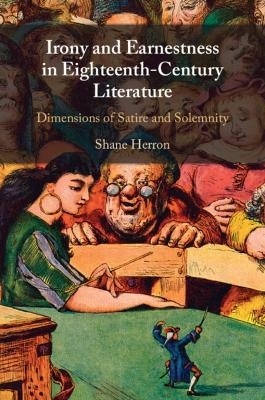
Irony and Earnestness in Eighteenth-Century Literature
Dimensions of Satire and Solemnity
Seiten
2024
Cambridge University Press (Verlag)
978-1-108-99504-7 (ISBN)
Cambridge University Press (Verlag)
978-1-108-99504-7 (ISBN)
Delving into the interaction between satire and more serious forms of literature, Shane Herron overturns long-standing assumptions around genre and style to explore how eighteenth-century writers in fact used irony to deepen the serious content of popular fiction and, conversely, used earnestness to sharpen their satirical bite.
The conventional literary history of the eighteenth century holds that upstart novelists and other intensely serious writers worked against the conservative and ironic sensibility of an earlier generation of satirists. However, many of these ostensibly earnest writers were exceptional satirists in their own right, employing the same ruses, tricks, and deceptions throughout their work. The novels of such canonical figures as Behn and Defoe, for example, passed themselves off as real documents, just as an earlier generation of hack writers combined the serious and the absurd. Re-examining this nexus between the ludicrous and the solemn, Shane Herron argues that intense earnestness was itself a central component of the ironic sensibility of the great age of literary satire and of Swift's work in particular. The sensationalism and confessionalism of earnestness were frequently employed tendentiously, while ironic and satirical literature often incorporated genuine moments of earnestness to advance writerly aims.
The conventional literary history of the eighteenth century holds that upstart novelists and other intensely serious writers worked against the conservative and ironic sensibility of an earlier generation of satirists. However, many of these ostensibly earnest writers were exceptional satirists in their own right, employing the same ruses, tricks, and deceptions throughout their work. The novels of such canonical figures as Behn and Defoe, for example, passed themselves off as real documents, just as an earlier generation of hack writers combined the serious and the absurd. Re-examining this nexus between the ludicrous and the solemn, Shane Herron argues that intense earnestness was itself a central component of the ironic sensibility of the great age of literary satire and of Swift's work in particular. The sensationalism and confessionalism of earnestness were frequently employed tendentiously, while ironic and satirical literature often incorporated genuine moments of earnestness to advance writerly aims.
Shane Herron is a contributing editor at The Scriblerian. He holds Academic Status in the College of Humanities, Arts and Social Sciences, Flinders University, and has taught English at a number of Universities in the US. His work has appeared in Theory & Event, Studies in English Literature, and Eighteenth-Century Fiction, among other venues.
1. Swift and the hacks: A relationship reconsidered; 2. 'By One of the Fair Sex': Irony, sovereignty, and sexual difference; 3. Keeping up appearances: Satire between preservation and reformation; 4. Dark humor and moral sense theory: Or, how Swift learned to stop worrying and love evil; 5. Gratitude for the ordinary: Defoe's irony.
| Erscheinungsdatum | 10.08.2024 |
|---|---|
| Zusatzinfo | Worked examples or Exercises |
| Verlagsort | Cambridge |
| Sprache | englisch |
| Maße | 152 x 229 mm |
| Gewicht | 367 g |
| Themenwelt | Geisteswissenschaften ► Sprach- / Literaturwissenschaft ► Anglistik / Amerikanistik |
| Geisteswissenschaften ► Sprach- / Literaturwissenschaft ► Literaturwissenschaft | |
| ISBN-10 | 1-108-99504-7 / 1108995047 |
| ISBN-13 | 978-1-108-99504-7 / 9781108995047 |
| Zustand | Neuware |
| Haben Sie eine Frage zum Produkt? |
Mehr entdecken
aus dem Bereich
aus dem Bereich
Poetik eines sozialen Urteils
Buch | Hardcover (2023)
De Gruyter (Verlag)
CHF 83,90
Buch | Softcover (2024)
belleville (Verlag)
CHF 27,95


